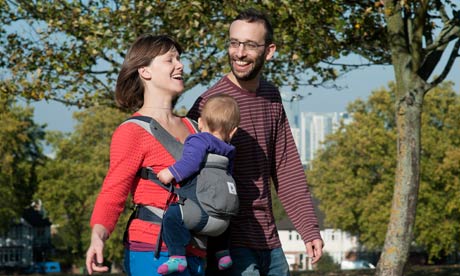
According to a 2010 study by the company BabyDam, the average UK parent spends £5,213.25 during pregnancy and the first 12 months of their baby's life. But not Anna and Paul Garland, a couple from Lewisham, south London, who I worked with in my role as a doula, providing support during pregnancy and birth. Initially I regarded them as "least prepared parents- to-be" but their minimal parenting philosophy has led me to question what are the essential buys.
Having bought only a baby carrier in advance, Paul made a mid-birth dash to Mothercare, returning home with a carrier bag and two hours to spare before their son Levin was born in a hastily-erected birth pool. "It was never a conscious decision not to buy anything beforehand," Anna insists. "We were busy and I really thought there would be time to shop, but our baby was born two weeks early."
There was more behind their shopping aversion than a hectic schedule. The couple were advocates of attachment parenting, a movement that encourages infants to be kept close and their needs met swiftly, without any emphasis on a baby-focused daily routine. (Critics of the philosophy are plentiful: in the Wall Street Journal, Erica Jong called it a "parents be damned" approach.) "A side-effect," says Anna, "is it requires very little stuff."
Anna and Paul have managed to spend just £800 in the first 12 months – about 15% of the norm. So what did they buy? In Paul's last-minute trolley dash he picked up nappies, vests, babygros and a blanket. Additional clothes were given as gifts, and since the birth they have acquired or bought nursing bras, another baby carrier, changing mat, a breast pump, potty, cup, cutlery and a car seat. They have no plans to invest in the items most consider vital: a pushchair or cot.
Now aged one, Levin still sleeps in bed with his parents. "We've researched it thoroughly and are happy about our decision as it allows us to respond to his needs immediately," says Anna. The official advice from the Department of Health shies away from recommending co-sleeping but gives guidance for those who are considering it on how to do so safely. A study released earlier this month indicates the need for more research into this, suggesting a link between co-sleeping and unexplained death in infants, though the study doesn't distinguish between parents such as the Garlands, adopting a considered co-sleeping practice with safety measures in place, and those who have not.
However, previous studies have indicated that bedsharing can decrease the risk of unexplained infant death, suggesting that newborns sleeping in contact with their mothers sleep better and have three times less stress on their hearts than those placed in a cot. Professor James McKenna of the University of Notre Dame mother-baby behavioural sleep laboratory is keen to emphasise the positives: "co-sleeping makes mothers and babies happy, which means it serves important biological functions. It permits mothers to manage easier breastfeeding (which is known to significantly reduce cot-death risks), while promoting increased sleep for mother and infant. It enhances communication skills among infants and provides an ideal venue for cognitive and emotional development. But if there's a lack of knowledge about dangerous bedsharing conditions, mothers are best sleeping alongside their infants on a different surface but not in the same bed."
Saving themselves the average £264 outlay on a pram, the Garlands have chosen instead to use a combination of a wrap sling and an Ergobaby carrier. While they've had to deal with a few negative comments, Paul believes that carrying his son "has meant Levin feels safe and secure." It is also much more practical for getting around on public transport.
Breastfeeding and baby-led weaning have eliminated the need for bottles and purees. They've also decided to invest in washable nappies, which they believe are better for their family and the environment. This meant a greater upfront cost (on average £400 plus £100 on washing, according to website The Cloth Nappy Tree), but a greater total saving compared with the average £1,274 spent on disposables.
Do Anna and Paul have any regrets about their small pile of kit and the lifestyle that inspired it? "You do have to make a new kind of space for your sex life when co-sleeping, and breastfeeding on cue means a baby-free late night out isn't on the cards," Anna says. "But it makes us all happier, our lives easier and I wouldn't sacrifice Levin's sense of security for anything. We discovered that the less you buy that's baby-specific and designed to put them at a distance, the easier it will be to meet their instinctive needs."
Oh, and it has saved them a fortune.
What are your tips for saving money during the first year of a child's life and beyond? Did you find buying things helped or hindered you when bonding with your baby?

